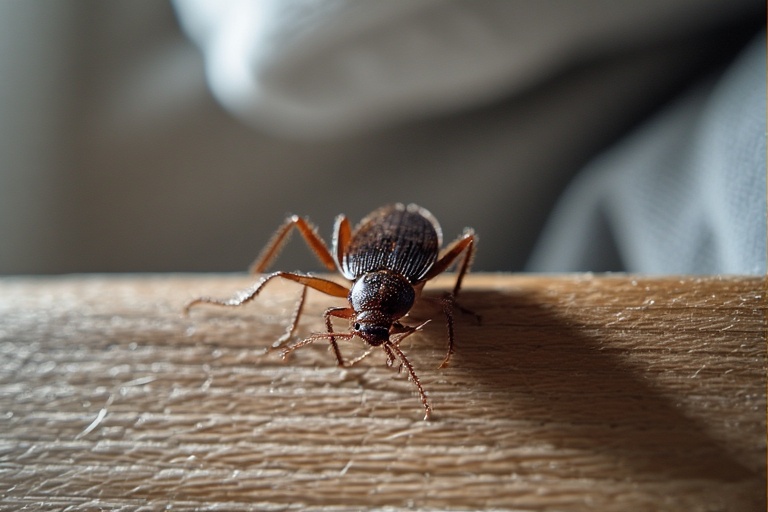Introduction to Bed Bugs in London
Bed bugs in London are a growing concern. These tiny pests disrupt sleep, cause stress, and spread quickly. Consequently, residents need reliable solutions. This guide explores bed bug identification, treatment options, and prevention tips. By understanding these pests, you can protect your home. Let’s dive into tackling bed bugs effectively.
What Are Bed Bugs?
Bed bugs are small, wingless insects that feed on human blood. Typically, they hide in mattresses, furniture, and cracks. At night, they emerge to bite, causing itchy welts. In London, bed bugs thrive in urban settings. Therefore, knowing their behavior is crucial for effective control and prevention.
Why Are Bed Bugs a Problem in London?
London’s dense population and frequent travel make it a bed bug hotspot. Moreover, shared spaces like apartments and hotels increase risks. Infestations spread rapidly in such environments. As a result, residents face challenges in controlling these pests. Understanding why bed bugs thrive helps you stay proactive in prevention.
How to Identify Bed Bugs in Your London Home
Physical Appearance of Bed Bugs
Bed bugs are reddish-brown, oval, and about 4-5 mm long. Young bed bugs, or nymphs, are smaller and translucent. After feeding, they appear swollen and redder. Consequently, spotting these traits helps confirm an infestation. Check mattresses, bed frames, and furniture for these signs regularly.
Common Signs of a Bed Bug Infestation
Look for small bloodstains on sheets or tiny dark fecal spots. Additionally, you might find shed skins or a musty odor. Bites on your skin, often in rows, are another clue. Therefore, inspecting your home thoroughly ensures early detection. Early action prevents a full-blown infestation.
Where Bed Bugs Hide in London Homes
Bed bugs hide in mattresses, headboards, and furniture seams. They also lurk in cracks, baseboards, and electrical outlets. In London’s compact flats, these hiding spots are common. Thus, regular inspections are essential. By checking these areas, you can catch bed bugs before they spread further.
Health Risks Associated with Bed Bugs
Bed bug bites cause itching, redness, and discomfort. Although they don’t transmit diseases, scratching can lead to infections. Moreover, infestations trigger stress and sleep issues. In London, where mental health matters, addressing bed bugs promptly is vital. Therefore, quick action protects both your health and peace of mind.
Why Bed Bugs Spread So Easily in London
London’s busy lifestyle fuels bed bug spread. Public transport, hostels, and second-hand furniture are common sources. Additionally, tourists and commuters unknowingly carry bed bugs. As a result, infestations can appear in any borough. Staying vigilant and acting fast prevents these pests from taking over your home.
How to Prevent Bed Bug Infestations in London
Inspect Second-Hand Furniture
Before bringing used furniture home, inspect it carefully. Bed bugs often hide in seams and crevices. Therefore, vacuum and clean items thoroughly. In London’s vibrant second-hand markets, caution is key. By checking furniture, you reduce the risk of introducing bed bugs into your space.
Use Protective Mattress Covers
Encasing mattresses and pillows in bed bug-proof covers is effective. These covers trap existing bugs and prevent new ones. Consequently, your bed stays protected. In London, where infestations are common, this step is essential. Invest in quality covers for long-term peace of mind.
Be Cautious When Traveling
Traveling increases bed bug risks. Always check hotel beds and luggage racks. Upon returning to London, wash clothes in hot water. Additionally, vacuum your suitcase before storing it. By taking these precautions, you avoid bringing bed bugs home. Stay proactive to keep your space pest-free.
Regular Cleaning and Decluttering
Clutter provides hiding spots for bed bugs. Therefore, keep your London home tidy. Vacuum carpets, rugs, and furniture regularly. Wash bedding in hot water weekly. By maintaining a clean environment, you reduce bed bug hiding places. Consistent cleaning is a powerful prevention tool.
DIY Bed Bug Treatment Options
Vacuuming and Steam Cleaning
Vacuuming removes bed bugs and eggs from surfaces. Focus on mattresses, furniture, and cracks. Afterward, use a steam cleaner on high heat. Steam kills bed bugs instantly. In London homes, this method is practical. However, combine it with other treatments for best results.
Washing and Drying Bedding
Wash infested bedding, clothes, and curtains in hot water (at least 60°C). Then, dry them on high heat. This kills bed bugs and eggs. Consequently, your belongings stay pest-free. In London’s fast-paced life, this simple step is a quick and effective solution.
Using Diatomaceous Earth
Diatomaceous earth is a natural powder that kills bed bugs. Sprinkle it in cracks, seams, and other hiding spots. It dehydrates pests over time. Therefore, it’s a safe, non-toxic option for London homes. Always use food-grade diatomaceous earth and follow safety instructions carefully.
When to Call a Professional Pest Control Service in London
DIY methods may not eliminate severe infestations. Professional pest control services in London offer advanced treatments. They use heat, chemicals, or freezing methods effectively. Moreover, experts ensure thorough eradication. If you notice persistent signs, contact a licensed professional immediately. Quick action saves time and money.
Choosing the Right Pest Control Service in London
Research Reputable Companies
Look for licensed, experienced pest control companies in London. Check reviews and ask for references. A reliable service offers guarantees and follow-ups. Consequently, you get effective results. Choosing a trusted provider ensures your bed bug problem is resolved efficiently and safely.
Ask About Treatment Methods
Different companies use various methods, like heat or chemical treatments. Therefore, ask about their approach and safety measures. Ensure they tailor solutions to your home. In London, eco-friendly options are popular. By understanding their process, you make an informed decision for your family’s safety.
Compare Costs and Services
Pest control costs in London vary. Request quotes from multiple providers. However, don’t choose based on price alone. Consider experience, methods, and guarantees. A thorough service prevents future infestations. Thus, investing in quality pest control saves you from recurring bed bug issues.
Common Myths About Bed Bugs in London
Bed Bugs Only Infest Dirty Homes
Many believe bed bugs only target dirty homes. However, they infest clean spaces too. They travel via luggage, furniture, or clothing. In London, even upscale flats can be affected. Therefore, cleanliness alone doesn’t prevent infestations. Vigilance and proactive measures are essential for everyone.
Bed Bugs Are Visible to the Naked Eye
While adult bed bugs are visible, nymphs and eggs are tiny. Consequently, early infestations are hard to spot. In London’s busy households, small signs often go unnoticed. Regular inspections help catch them early. Use a flashlight and magnifying glass to detect hidden bed bugs.
Bed Bugs Only Bite at Night
Bed bugs prefer nighttime but can bite during the day. If you nap on infested furniture, bites can occur. Thus, don’t assume daytime safety. In London’s varied schedules, bites happen anytime. Check your surroundings to avoid unexpected encounters with these pests.
The Cost of Bed Bug Treatment in London
Treatment costs depend on infestation severity and methods used. DIY solutions are cheaper but less effective for large infestations. Professional services in London range from £100 to £500. Therefore, weigh your options carefully. Investing in professional help often prevents costly re-infestations.
How to Recover After a Bed Bug Infestation
Clean and Sanitize Your Home
After treatment, clean your home thoroughly. Vacuum floors, furniture, and mattresses. Wash all bedding in hot water. Additionally, sanitize surfaces to remove residue. In London, a clean home boosts recovery. This step ensures no bed bugs linger and restores your peace.
Monitor for Re-Infestation
Bed bugs can return if not fully eradicated. Therefore, inspect your home regularly for signs. Use bed bug monitors or traps for early detection. In London’s urban setting, vigilance is key. By staying proactive, you prevent a second infestation and maintain a pest-free home.
Educate Yourself and Others
Learn about bed bug habits and prevention. Share tips with family or roommates. In London, community awareness reduces risks. Consequently, informed households act faster. Education empowers you to spot and address bed bugs early. Stay informed to protect your home long-term.
FAQs About Bed Bugs in London
How Do Bed Bugs Enter Homes in London?
Bed bugs enter via luggage, used furniture, or clothing. They also spread through shared walls in apartments. In London, public transport and travel increase risks. Therefore, inspect items before bringing them home. Staying cautious prevents unwanted pests from invading your space.
Can I Get Rid of Bed Bugs Without Professional Help?
Yes, small infestations can be managed with DIY methods like vacuuming, steaming, and washing. However, severe cases require professional help. In London, experts offer advanced solutions. Consequently, combining DIY and professional treatments ensures complete eradication. Act quickly to avoid escalation.
How Long Does Bed Bug Treatment Take?
Treatment duration varies. DIY methods take days to weeks, depending on effort. Professional treatments often resolve issues in 1-3 sessions. In London, follow-up visits ensure success. Therefore, patience and consistency are crucial. Monitor progress to confirm bed bugs are gone.
Are Bed Bug Bites Dangerous?
Bed bug bites cause itching and discomfort but don’t spread diseases. However, excessive scratching can lead to infections. In London, where stress is common, bites affect mental health. Thus, treat bites with antihistamines and consult a doctor if needed. Quick action prevents complications.
Conclusion: Take Control of Bed Bugs in London Today
Bed bugs in London are a manageable problem with the right approach. By identifying signs early, using effective treatments, and preventing future infestations, you can reclaim your home. Don’t let these pests disrupt your life. Act now—inspect your home, try DIY methods, or hire a professional pest control service. Protect your peace of mind today!






